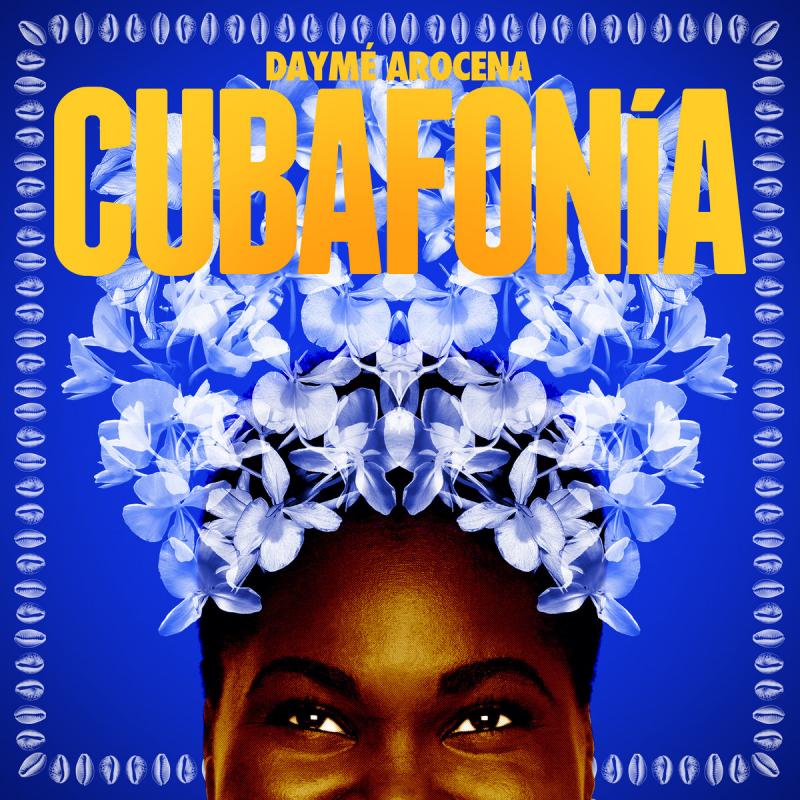Albums of the Year 2017: Daymé Arocena - Cubafonia | reviews, news & interviews
Albums of the Year 2017: Daymé Arocena - Cubafonia
Albums of the Year 2017: Daymé Arocena - Cubafonia
Sumptuous survey of Cuban song wears its learning lightly

All things considered, there aren’t many criteria by which this album, however cosmopolitan its influences, sensitive and precise its vocals and supple its rhythms, is really the best of the year.
On the other hand, it is very likely she will still be loved, listened to and learned from in 2042 as a model of intelligent, creative music-making. Arocena has classical training from one of Cuba’s prestigious academies, yet sings as if she has grown up with Cuban folk and pop. Cubafonia isn’t ostentatious, yet extends capaciously from slick, bubbly Cuban pop into Latin jazz and more specialised areas of Cuban traditional song such as changüí, in which the original blend of Spanish guitar and Bantu percussion can still be heard.
The musical and religious practice of santería are evident in, among others, the opening track “Eleggua”, a Yoruba greeting to the orisha, a divine spirit. This is followed by “La Rumba Me Llamo Yo”, a form with a range of African traditions. There are reminders, too, in tracks such as “Mambo Na’ Mà”, with its smouldering, funky swing, that Cuban traditions are cousins of New Orleans. Arocena has assimilated such an impressive range of musical cultures into an entirely plausible and engaging vernacular that it doesn’t feel like a work of ethnomusicology, even though it some respects it is.
Daymé Arocena – still only in her mid-twenties – is widely regarded as Cuba’s best singer, and recently has benefited from exposure and development offered by Gilles Peterson’s Havana Cultura Project. A recording of this quality is a testament to Peterson’s project. We are still at the launchpad stage of what will inevitably become a stellar singing career, with potential for astonishing collaborations. 2042 here we come!
rating
Share this article
The future of Arts Journalism
You can stop theartsdesk.com closing!
We urgently need financing to survive. Our fundraising drive has thus far raised £49,000 but we need to reach £100,000 or we will be forced to close. Please contribute here: https://gofund.me/c3f6033d
And if you can forward this information to anyone who might assist, we’d be grateful.

Subscribe to theartsdesk.com
Thank you for continuing to read our work on theartsdesk.com. For unlimited access to every article in its entirety, including our archive of more than 15,000 pieces, we're asking for £5 per month or £40 per year. We feel it's a very good deal, and hope you do too.
To take a subscription now simply click here.
And if you're looking for that extra gift for a friend or family member, why not treat them to a theartsdesk.com gift subscription?
more New music
 Suzanne Vega and Katherine Priddy, Royal Albert Hall review - superlative songwriters
Two brilliant voices fill the Royal Albert Hall
Suzanne Vega and Katherine Priddy, Royal Albert Hall review - superlative songwriters
Two brilliant voices fill the Royal Albert Hall
 Kali Malone and Drew McDowell generate 'Magnetism' with intergenerational ambience
Young composer and esoteric veteran achieve alchemical reaction in endless reverberations
Kali Malone and Drew McDowell generate 'Magnetism' with intergenerational ambience
Young composer and esoteric veteran achieve alchemical reaction in endless reverberations
 Benson Boone, O2 London review - sequins, spectacle and cheeky charm
Two hours of backwards-somersaults and British accents in a confetti-drenched spectacle
Benson Boone, O2 London review - sequins, spectacle and cheeky charm
Two hours of backwards-somersaults and British accents in a confetti-drenched spectacle
 Midlake's 'A Bridge to Far' is a tour-de-force folk-leaning psychedelic album
The Denton, Texas sextet fashions a career milestone
Midlake's 'A Bridge to Far' is a tour-de-force folk-leaning psychedelic album
The Denton, Texas sextet fashions a career milestone
 'Vicious Delicious' is a tasty, burlesque-rockin' debut from pop hellion Luvcat
Contagious yarns of lust and nightlife adventure from new pop minx
'Vicious Delicious' is a tasty, burlesque-rockin' debut from pop hellion Luvcat
Contagious yarns of lust and nightlife adventure from new pop minx
 Music Reissues Weekly: Hawkwind - Hall of the Mountain Grill
Exhaustive box set dedicated to the album which moved forward from the ‘Space Ritual’ era
Music Reissues Weekly: Hawkwind - Hall of the Mountain Grill
Exhaustive box set dedicated to the album which moved forward from the ‘Space Ritual’ era
 'Everybody Scream': Florence + The Machine's brooding sixth album
Hauntingly beautiful, this is a sombre slow burn, shifting steadily through gradients
'Everybody Scream': Florence + The Machine's brooding sixth album
Hauntingly beautiful, this is a sombre slow burn, shifting steadily through gradients
 Cat Burns finds 'How to Be Human' but maybe not her own sound
A charming and distinctive voice stifled by generic production
Cat Burns finds 'How to Be Human' but maybe not her own sound
A charming and distinctive voice stifled by generic production
 Todd Rundgren, London Palladium review - bold, soul-inclined makeover charms and enthrals
The wizard confirms why he is a true star
Todd Rundgren, London Palladium review - bold, soul-inclined makeover charms and enthrals
The wizard confirms why he is a true star
 It’s back to the beginning for the latest Dylan Bootleg
Eight CDs encompass Dylan’s earliest recordings up to his first major-league concert
It’s back to the beginning for the latest Dylan Bootleg
Eight CDs encompass Dylan’s earliest recordings up to his first major-league concert
 Ireland's Hilary Woods casts a hypnotic spell with 'Night CRIÚ'
The former bassist of the grunge-leaning trio JJ72 embraces the spectral
Ireland's Hilary Woods casts a hypnotic spell with 'Night CRIÚ'
The former bassist of the grunge-leaning trio JJ72 embraces the spectral

Add comment